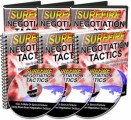 License Type: Master Resell Rights
License Type: Master Resell Rights  File Type: ZIP
File Type: ZIP
 SKU: 64443
SKU: 64443  Shipping: Online Download
Shipping: Online Download
Sample Content Preview
Introduction
Former U.S. President Franklin D. Roosevelt once said in a speech, "We have nothing to fear but fear itself." If you take the statement literally, it doesn't really make sense because you can't really be afraid of fear. What Roosevelt was trying to say is that fear is a crippling emotion that can hold back nations and individuals from achieving greatness. In that sense, the consequences of fear can be terrifying.
Good fear vs. bad fear
Fear is a strong emotion, an instinctive reaction that we're endowed with to ensure the survival of our species. It’s also a primeval instinct that we see in animals as well. As human civilizations became more complex and advanced, so did our fears become more varied and compounded. The caveman in prehistoric times wasn't worrying about the financial risks of taking out a second mortgage or making a career change. His primary goal revolved around one thing - survival.
Our current fears stem from the same core instinct but in comparison to our earliest ancestors, are much less of a threat. Oftentimes, rather than help us survive in the modern world, they hinder our ability to lead our best possible lives.
Now, this book is in no way trying to underplay or belittle your fears. Your fears are very valid. In fact, some actions should be tempered with a little bit of fear and caution. However, some fears can get blown out of proportion and take over your life. In this case, you need to pay attention.
Your fears could cause you to miss out on amazing opportunities that could change your life. Letting fear control you could be the reason you feel stifled, lost, and demotivated. Your fears, rather than protecting you, could be destroying your chances for happiness and success.
For example, the fear of swimming in shark-infested waters is a good fear. The fear of quitting a job that you hate and that offers no chance for advancement is a bad fear. It can hold you back from pursuing your true passion and showcasing your skills. It's these types of fears that this book will help you address.
This book is going to help you identify 7 types of fear that could be limiting your ability to achieve success These are fears that could hinder your care advancement or hold you back from building strong, healthy relationships. They can be the roadblocks to finding happiness and fulfillment.
Here are these 7 most common fears and a few tips on how to overcome them.
1.Fear of Risk
Risk is related to a perceived loss resulting from an action. Oftentimes, there's also a potential gain but we tend to magnify the loss while minimizing the gains. The fear of taking risks is a very strong primal fear related to our survival instinct where our prehistoric ancestors were surrounded by peril. Taking risks could mean getting eaten by wild animals or some other horrible death.
This fear remains very strong in us and is the first emotion that overcomes us when we think of taking important action.
How it holds you back
Let's say you want to start your own business. You have a great idea for a useful product or service that's scalable. There's an audience for it and your initial market research tells you it will be in demand. You're very excited. Then, the fear of risk kicks in and your mind starts bombarding you with 'what if?’
What if the idea's not so good after all? What if you take out a loan and can't repay it? What if the product doesn't sell? What if the market collapses? What if there's a nuclear war and you lose everything?
The 'what if' questions typically escalate into gloom and doom scenarios until the fear paralyzes you into inaction. Realistically, if there's a nuclear war, everybody's going to be out of business, aren't they? This is how the concept of risk can really play on your fear of loss.
Your fear ends up holding you back from, doing something that can have some real benefits for you. So, you ditch the idea and decide to stay on in a job you hate that's stifling your potential and ambition. You convince yourself that being miserable is safer than failing miserably!
Now, consider the alternative: you realistically assess the risks involved, plan for them and start your own business. You embark on an exciting journey when you become your own boss, take control of your life, and grow a super successful business. This is just one example of how fear of risk can hold you back from great things.
Action steps
Assess and evaluate risks
Identify your desired outcome. Let's stick with the example of starting your own business. Realistically and honestly assess the risks related to the outcome. In this case, they could be using your savings for capital, taking out a loan and changing interest rates or liabilities or hazards related to your product. I would also include the risk of not making any income from the business for a few months until it's up and running.
Weigh the desired outcome (establishing a successful business) against the risks involved and honestly assess the possibility of these risks really happening. You'll most likely find that the outcome or goal is worth the risks.
Assessing possible risks and putting them into proportion usually shows you that they're not as bad as you imagined, not likely to happen or if they do, can be managed.
Plan for risk
When you've identified all the possible risks, create a risk management plan for each one. This will give you tremendous peace of mind and confidence because you're mentally prepared and your back is covered.
Having a risk management plan or a plan B will arm you with the tools to immediately take action to mitigate or eliminate risks with the least possible losses. Oftentimes, many of the imagined risks never come to pass but having a plan B is one of the most powerful ways to break your fear of risk.
Set clear goals
Always define your goal or goals clearly and factor in the potential risks. Include sub-goals of steps you need to take to avoid risk. Your goal map should include benchmarks or timeframes where you stop and assess your progress to ensure that all is on track and to make modifications if something seems to be heading towards a risk.
- License: Master Resell Rights
- Category:Ebooks
- Tags:2022 Ebooks With Audio Master Resale Rights








